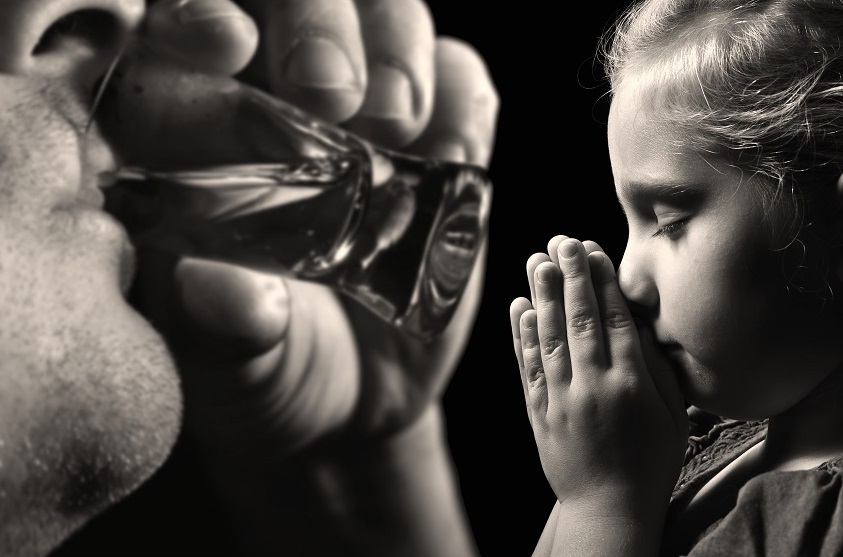
(This content is being used for illustrative purposes only; any person depicted in the content is a model)
Author: Justin Mckibben
Estimates show that in America roughly 10% of the population is addicted to alcohol or drugs. At first you might think 10% doesn’t sound like a lot. How does 33 million people sound? And if overdose and death rates have taught us anything, it’s that this problem is a serious and lethal one. But not only do we see the pain and turmoil of those who struggle, but we have to see what the families go through. The individual suffers deeply, but we cannot forget the children of alcoholics.
These numbers show that millions of parents, spouses and children are destructively impacted as they live with a person suffering from addiction.
National Children of Alcoholics Awareness Week started on February 12th and went to the 18th. This observation is to help spread public awareness about the impact of alcohol and drugs on children and families. While the official week of observation has ended, we encourage people to take the chance this month to continue the conversation. We don’t just acknowledge the issue for 7 days a year, right?
The Truth about Children of Alcoholics
Alcoholism is a chronic disease with a far-reaching impact.
- In America, experts estimate 6.6 million children under 18 live with at least one alcoholic parent
- One in four children in the U.S. are witness to alcoholism or addiction to drugs regularly
According to The National Association for Children of Alcoholics (NACoA), children of alcoholics experience many hardships that have a profound impact on their futures. Children of alcoholics typically:
- Have poorer language skills
- Have more absences from school
- Are more at risk for mental health disorders
- Higher risk of physical health issues
- Are at a significantly higher risk of becoming alcoholics themselves when they grow up
How to Help Children of Alcoholics
Most people have the knee-jerk reaction to insist a child should be removed from a detrimental environment. To many it makes sense that if the child is put in danger, they should be taken from their home to be kept safe. If we can’t always help the alcoholics, at least the children of alcoholics should be protected, right? The idea is the children of alcoholics can then have a stable environment while the parent gets treatment.
However, others would argue against such an approach, saying it not only breaks up the family unit, but it could also create a more instability. Removing the children of alcoholics from their homes and putting them in unfamiliar environments might only make things worse. Sometimes this process can create new stress and fear in a child, and ultimately be counterproductive.
So the unique difficulty in helping children of alcoholics is finding a way to maintain stability while still addressing the issues in the home, specifically those connected with the addiction.
Family Programs Part of Holistic Healing
Thankfully, complete removal from the recovery process is not the way it has to be for the families of those who struggle. Newer, more holistic treatment modalities make it a point to incorporate the children of alcoholics and their families in the treatment process.
An effective family program, such as the Palm Healthcare Family Program, can help to support the spouses, parents or children of alcoholics and addicts in many ways. Communicating with families and involving them in the recovery plan tends to make the living environment less dysfunctional.
A key element to assisting the family and children of alcoholics is education. Understanding the individual’s difficulties, they are able to provide an elevated level of support to the patient from home. These kinds of family involved programs can help the children of alcoholics get a better perspective on their parent’s behavior. At the same time, it gives families a chance to heal in tandem with their loved one.
We would like to offer you the FREE GIFT of a checklist to help decipher if you are helping or hurting a loved one who is struggling with addiction.
The Family for the Future
As innovation and education provide lasting results, treatment is beginning to grow in ways that have a stronger impact. Even elected officials and policy makers are now focusing on the impact of the family of the person addicted to drugs or alcohol.
The reality is, every person suffering from addiction issues eventually has to return home. Taking children away from their parents does not solve the issues, because eventually we want the individual to be able to live in their home environment. Recovery is about to reuniting families, not tearing them further apart. A more supportive family environment will go a long way in helping people in recovery maintain lasting sobriety.
This is why welcoming the family is good for the future. Programs like Palm Partners Recovery Center believe in keeping the spouses, parents and children of alcoholics and addicts connected to the person who needs their support the most. Overcoming the isolation and having love and connection in your corner can change the game. So even though National Children of Alcoholics Awareness Week ended, we still want to challenge everyone to bring their kids or their parents closer together.